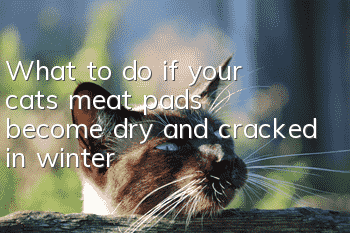What to do if your cat’s meat pads become dry and cracked in winter

In winter, if your cat’s meat pads are dry and cracked, hydrate it properly and try to replace most of its dry food with wet food; wipe your pet’s feet with foam to keep the skin on its feet soft and healthy; wear protective boots for your cat to protect its claws; Keep it indoors; treat bleeding and cracked paws and take it to the vet.
Appropriate hydration
Good hydration is an important aspect of a cat's health and well-being, which is also important in preventing dry and cracked paws. A cat's water requirements will increase if it is on a dry food diet. Much to the distress of cat owners, hydration in cats is often overlooked because it is difficult to get them to drink. Try using a pet fountain instead of a regular bowl of water. The free-falling water from the fountain may entice your cat to drink more.
If your cat refuses increased water intake, try replacing most of his dry food with wet food. Raw cat food or canned food is rich in water and can thoroughly rehydrate even the most stubborn cat. Also look for cat food formulated for dry skin and coat. Cat foods designed for healthy skin and coat have higher moisture content and contain more omega-3 fatty acids.
Wipe pet feet with foam
People need help keeping the skin on their feet soft and healthy, and the same goes for your cat's paw pads. If possible, it is recommended to wipe the cat's paw pads with foot cleaning foam 2-3 times a week. Cats lick their paws as part of their daily grooming routine, but when you apply a balm or ointment, your cat may lick its paws more because it feels something is there. Therefore, it is important to only use products that are safe for cats and will not harm their health if they ingest them.
Wear protective boots for cats
Chemicals and debris can seriously dry out your cat's claws when walking on hot or cold surfaces. These chemicals can be toxic to your pet and can get into the skin if there are any cracks. Cats may also lick some of these chemicals from their paws during self-grooming. Protect your cat's claws with protective boots before going for a walk. Boots or socks designed for puppies may fit average-sized cats. If your cat leaves the house without protective boots, carefully clean her paws with a warm, damp cloth as soon as possible.
Keeping cats indoors
One of the effective ways to improve a cat's cracked claws is to keep the cat indoors only. Not allowing your cat to roam outside will reduce further irritation to the paws and help it improve with the treatments above. If your cat refuses to stay indoors, try installing a fence in your backyard to keep it indoorsSome outdoor time in a controlled environment.
Treating bleeding and cracked paws
If your cat has cracks that open or bleed, take her to the vet. Your veterinarian will prescribe similar treatments for minor cracks and cuts, adding topical medications to prevent any potential infection. In older cats, cracked claws may be a symptom of possible kidney failure or liver dysfunction. This reduces the absorption of important nutrients from your cat's diet, compromising the integrity of his skin and coat. Chronic skin conditions require prescription medications. If your cat shows an adverse reaction to any treatment, tell your veterinarian immediately that your cat may be sensitive or allergic to some of the ingredients in the medication.
- What does it mean if a mother cat eats a kitten?
- What's going on with the cat and the hen squatting?
- Cats love to eat meat. What kinds of meat are suitable for cats to eat in daily life?
- What does a cat’s airplane ears mean?
- How do you get your cat to adapt to new cat litter?
- How to remove odors from the home of a cat-raising family?
- What to do if your cat’s nipples are ulcerated
- Why does Garfield sneeze?
- Cat kidney failure symptoms
- How to train a Pomeranian cat to catch mice



